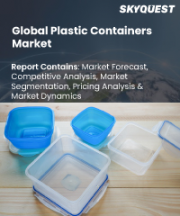
|
시장보고서
상품코드
1658682
인트라로지스틱스 컨테이너 시장 : 소재별, 적재량별, 최종 사용자별, 지역별 세계 동향 분석, 경쟁 구도 및 예측(2019-2031년)Intralogistics Containers Market, By Material; By Load Capacity; By End User; By Region (North America, Europe, Asia Pacific, Latin America, Middle East and Africa ), Global Trend Analysis, Competitive Landscape & Forecast, 2019-2031 |
||||||
세계의 인트라로지스틱스 컨테이너 시장은 전자상거래의 융성, 자동화의 도입, 효율화의 요구, 지속가능성의 중시, 창고의 최적화 등을 주된 이유로서 활황을 나타내고 있습니다.
세계 인트라로지스틱스 컨테이너 시장 규모는 2024년 87억 2,000만 달러에 달했습니다. 2025년부터 2031년까지의 예측 기간 동안 14.20%의 연평균 복합 성장률(CAGR)로 성장하여 2031년에는 208억 5,000만 달러에 달할 것으로 예측되고 있습니다. 세계의 인트라로지스틱스 컨테이너 시장은 창고 및 생산 시설에서의 자동화, 로봇 도입 증가, 효율성의 향상, 수작업의 삭감에 의해 견인되고 있습니다. 전자상거래 성장으로 인해 주문 처리 및 재고 관리를 위한 효율적인 자재관리 솔루션에 대한 수요가 증가하고 있습니다. 또한 비용 효율적이고 재사용 가능하며 지속 가능한 포장 솔루션에 대한 요구가 물류 컨테이너의 채택을 뒷받침하고 있습니다. 경량으로 내구성이 있는 플라스틱 등, 컨테이너 소재의 진보가 그 기능성을 높이고 있습니다. 또한 공급망 병목 현상 감소에 대한 관심과 실시간 추적 및 관리를 위한 IoT 통합도 시장 성장에 기여하고 있습니다.
린 생산 방식의 채택은 세계 인트라로지스틱스 컨테이너 시장의 중요한 성장 요인입니다. 산업계가 낭비를 최소화하고 효율성을 높이고 워크플로우를 최적화하려고 노력하는 동안 인트라로지스틱스 컨테이너 수요가 급증하고 있습니다. 이러한 컨테이너는 효율적인 재질 처리, 간소화된 재고 관리, 운영 병목 현상을 줄여 린 운영을 지원합니다. 모듈식으로 내구성이 뛰어나고 재사용 가능한 설계는 지속가능성의 목표에 부합하며 그 매력을 더욱 높여줍니다. 자동차, 소매, 전자상거래와 같은 업계에서는 저스트-인-타임 생산 및 유통 모델을 지원하기 위해 인트라로지스틱스 컨테이너를 통합하는 사례가 늘어나 시장 성장에 박차를 가하고 있습니다. 이 린 원칙과의 무결성은 다양한 제조 분야에서 지속적인 채택을 보장합니다.
전자상거래, 소매업, 제조업 등의 산업에서 취급 및 운송에 널리 사용되고 있기 때문에 500kg 이상의 카테고리가 세계 인트라로지스틱스 컨테이너 시장에서 주요 시장 점유율을 차지하고 있습니다. 이러한 대용량 컨테이너는 대용량·대중량에 대응할 수 있으므로, 사내 물류의 최적화와 업무 효율의 향상에 필수적입니다. 산업계가 사업 규모를 계속 확대하는 가운데 500kg을 넘는 용적을 가진 컨테이너에 대한 의존은 시장에서 주도적 지위를 유지할 것으로 예상됩니다.
지정학적 긴장 증가는 세계 공급망을 혼란스럽게 하고, 원재료 비용을 증가시키고, 생산과 유통에 지연을 초래함으로써 세계 인트라로지스틱스 컨테이너 시장에 큰 영향을 미칩니다. 무역제한, 관세, 통화가치의 변동은 경영과제를 높이고, 지역 불안정화는 투자를 억제하고, 국경을 넘는 물류를 복잡하게 합니다. 기업은 보험 및 컴플라이언스 비용 상승에 직면하여 현지 생산으로의 전환과 공급망의 다양화를 촉진하고 있습니다. 그러나 기업이 불확실한 환경에서 효율성과 적응성을 우선시함에 따라 고급 컨테이너 시스템을 포함한 탄력적 인 인트라 물류 솔루션에 대한 수요가 증가하고 있습니다.
이 보고서는 세계 인트라로지스틱스 컨테이너 시장을 조사했으며 시장 개요와 함께 소재별, 적재량별, 최종 사용자별, 지역별 동향, 경쟁 구도, 시장 진출기업 프로파일 등의 정보를 제공합니다.
목차
제1장 조사 프레임워크
제2장 주요 요약
제3장 세계 인트라로지스틱스 컨테이너 시장 인사이트
- 업계 밸류체인 분석
- DROC 분석
- 성장 촉진요인
- 성장 억제요인
- 기회
- 과제
- 기술 진보/최근 동향
- 규제 프레임워크
- Porter's Five Forces 분석
제4장 세계의 인트라로지스틱스 컨테이너 시장 : 마케팅 전략
제5장 세계의 인트라로지스틱스 컨테이너 시장 : 가격 분석
제6장 세계의 인트라로지스틱스 컨테이너 시장 : 지역 분석
- 세계의 인트라 로지스틱스 컨테이너 시장, 지역 분석(2024년)
- 세계의 인트라 로지스틱스 컨테이너 시장, 시장의 매력 분석(2024-2030년)
제7장 세계의 인트라로지스틱스 컨테이너 시장 개요
- 시장 규모와 예측(2019-2031년)
- 시장 점유율과 예측
- 소재별
- 적재량별
- 최종 사용자별
- 지역별
제8장 북미의 인트라로지스틱스 컨테이너 시장
제9장 유럽의 인트라로지스틱스 컨테이너 시장
제10장 아시아태평양의 인트라로지스틱스 컨테이너 시장
제11장 라틴아메리카의 인트라로지스틱스 컨테이너 시장
제12장 중동 및 아프리카의 인트라로지스틱스 컨테이너 시장
제13장 경쟁 구도
- 주요 참가 기업과 그 제공 내용의 리스트
- 2024년 세계 인트라로지스틱스 컨테이너 기업의 시장 점유율 분석
- 경영 파라미터별 경쟁 벤치마킹
- 주요 전략적 전개(합병, 인수, 제휴 등)
제14장 세계의 인트라로지스틱스 컨테이너 시장 : 수입과 수출
제15장 증가하는 지정학적 긴장이 세계 인트라로지스틱스 컨테이너 시장에 미치는 영향
제16장 기업 프로파일(기업 개요, 재무 매트릭스, 경쟁 구도, 주요 인원, 주요 경쟁업체, 연락처, 전략적 전망, SWOT 분석)
- Daifuku Co., Ltd
- Jungheinrich AG
- Kion Group AG
- Dematic
- SSI Schaefer AG
- KNAPP AG
- Swisslog Holding AG
- Vanderlande Industries BV
- Beumer Group GmbH & Co. KG
- Kardex Group
- Honeywell International Inc
- Midea Group
- 기타
제17장 주요 전략적 제안
제18장 조사 방법
KTH 25.03.06Global Intralogistics Containers Market Zooming 2.4X to Reach USD 21 Billion by 2031
Global Intralogistics Containers Market is booming primarily due to the thriving e-commerce, automation adoption, efficiency demand, sustainability focus, and warehouse optimization.
BlueWeave Consulting, a leading strategic consulting and market research firm, in its recent study, estimated Global Intralogistics Containers Market size by value at USD 8.72 billion in 2024. During the forecast period between 2025 and 2031, BlueWeave expects Global Intralogistics Containers Market size to boom at a robust CAGR of 14.20% reaching a value of USD 20.85 billion by 2031. Global Intralogistics Containers Market is driven by the rising adoption of automation and robotics in warehouses and production facilities, improving efficiency and reducing manual handling. The growth of e-commerce has increased demand for efficient material handling solutions for order fulfillment and inventory management. Additionally, the need for cost-effective, reusable, and sustainable packaging solutions boosts the adoption of intralogistics containers. Advancements in container materials, such as lightweight and durable plastics, enhance their functionality. The growing focus on reducing supply chain bottlenecks and the integration of IoT for real-time tracking and management also contribute to market growth.
Opportunity - Lean Manufacturing Principles
The adoption of lean manufacturing principles is a significant growth driver for Global Intralogistics Containers Market. As industries strive to minimize waste, improve efficiency, and optimize workflows, demand for intralogistics containers has surged. These containers support lean operations by enabling efficient material handling, streamlined inventory management, and reduced operational bottlenecks. Their modular, durable, and reusable designs align with sustainability goals, further enhancing their appeal. Industries such as automotive, retail, and e-commerce increasingly integrate intralogistics containers to support just-in-time production and distribution models, fueling market growth. This alignment with lean principles ensures their continued adoption across diverse manufacturing sectors.
Above 500 Kgs Load Capacity Leads Global Intralogistics Containers Market
The above 500 kgs category accounts for a major market share in Global Intralogistics Containers Market by load capacity, due to its widespread use in industries such as e-commerce, retail, and manufacturing for handling and transporting. The ability of these high-capacity containers to accommodate large volumes and weights makes them essential for optimizing internal logistics and enhancing operational efficiency. As industries continue to scale up operations, the reliance on containers with capacities above 500 kg is expected to sustain their leading position in the market.
Impact of Escalating Geopolitical Tensions on Global Intralogistics Containers Market
Escalating geopolitical tensions significantly impact Global Intralogistics Containers Market by disrupting global supply chains, increasing raw material costs, and causing delays in production and distribution. Trade restrictions, tariffs, and fluctuating currency values heighten operational challenges, while heightened regional instability discourages investments and complicates cross-border logistics. Companies face rising insurance and compliance costs, prompting a shift toward localized manufacturing and supply chain diversification. However, demand for resilient intralogistics solutions, including advanced container systems, grows as businesses prioritize efficiency and adaptability in uncertain environments.
Competitive Landscape
Global Intralogistics Containers Market is highly fragmented, with numerous players serving the market. Major companies dominating the market include Daifuku Co., Ltd, Jungheinrich AG, Kion Group AG, Dematic, SSI Schaefer AG, KNAPP AG, Swisslog Holding AG, Vanderlande Industries B.V., Beumer Group GmbH & Co. KG, Kardex Group, Honeywell International Inc, and Midea Group. The key marketing strategies adopted by the players are facility expansion, product diversification, alliances, collaborations, partnerships, and acquisitions to expand their customer reach and gain a competitive edge over their competitors in Global Intralogistics Containers Market.
The report's in-depth analysis provides information about growth potential, upcoming trends, and Global Intralogistics Containers Market statistics. It also highlights the factors driving forecasts of total market size. The report promises to provide recent technology trends in Global Intralogistics Containers Market along with industry insights to help decision-makers make sound strategic decisions. Furthermore, the report also analyses the growth drivers, challenges, and competitive dynamics of the market.
Table of Contents
1. Research Framework
- 1.1. Research Objective
- 1.2. Product Overview
- 1.3. Market Segmentation
2. Executive Summary
3. Global Intralogistics Containers Market Insights
- 3.1. Industry Value Chain Analysis
- 3.2. DROC Analysis
- 3.2.1. Growth Drivers
- 3.2.1.1. E-commerce Boom
- 3.2.1.2. Supply Chain Complexity
- 3.2.1.3. Increase in Automation and Robotics
- 3.2.2. Restraints
- 3.2.2.1. High Initial Investment Costs
- 3.2.2.2. Maintenance and Repair Costs
- 3.2.3. Opportunities
- 3.2.3.1. Lean Manufacturing Principles
- 3.2.3.2. Advancement in technology
- 3.2.4. Challenges
- 3.2.4.1. Standardization Challenges
- 3.2.4.2. Space Constraints
- 3.2.1. Growth Drivers
- 3.3. Technological Advancements/Recent Developments
- 3.4. Regulatory Framework
- 3.5. Porter's Five Forces Analysis
- 3.5.1. Bargaining Power of Suppliers
- 3.5.2. Bargaining Power of Buyers
- 3.5.3. Threat of New Entrants
- 3.5.4. Threat of Substitutes
- 3.5.5. Intensity of Rivalry
4. Global Intralogistics Containers Market: Marketing Strategies
5. Global Intralogistics Containers Market: Pricing Analysis
6. Global Intralogistics Containers Market: Geographical Analysis
- 6.1. Global Intralogistics Containers Market, Geographical Analysis, 2024
- 6.2. Global Intralogistics Containers Market, Market Attractiveness Analysis, 2024-2030
7. Global Intralogistics Containers Market Overview
- 7.1. Market Size & Forecast, 2019-2031
- 7.1.1. By Value (USD Million)
- 7.2. Market Share & Forecast
- 7.2.1. By Material
- 7.2.1.1. Plastic
- 7.2.1.2. Cardboard
- 7.2.1.3. Metal/Steel
- 7.2.2. By Load Capacity
- 7.2.2.1. Up to 50 Kgs
- 7.2.2.2. 50-100 Kgs
- 7.2.2.3. 10-500 Kgs
- 7.2.2.4. Above 500 Kgs
- 7.2.3. By End User
- 7.2.3.1. Logistics & warehouses
- 7.2.3.2. Food & Beverages
- 7.2.3.3. Retail & Consumer Products
- 7.2.3.4. Chemicals
- 7.2.3.5. Industrial Manufacturing
- 7.2.3.6. Electrical & Electronics
- 7.2.3.7. Healthcare & Pharmaceuticals
- 7.2.3.8. Others
- 7.2.4. By Region
- 7.2.4.1. North America
- 7.2.4.2. Europe
- 7.2.4.3. Asia Pacific (APAC)
- 7.2.4.4. Latin America (LATAM)
- 7.2.4.5. Middle East and Africa (MEA)
- 7.2.1. By Material
8. North America Intralogistics Containers Market
- 8.1. Market Size & Forecast, 2019-2031
- 8.1.1. By Value (USD Million)
- 8.2. Market Share & Forecast
- 8.2.1. By Material
- 8.2.2. By Load Capacity
- 8.2.3. By End User
- 8.2.4. By Country
- 8.2.4.1. United States
- 8.2.4.1.1. By Material
- 8.2.4.1.2. By Load Capacity
- 8.2.4.1.3. By End User
- 8.2.4.2. Canada
- 8.2.4.2.1. By Material
- 8.2.4.2.2. By Load Capacity
- 8.2.4.2.3. By End User
9. Europe Intralogistics Containers Market
- 9.1. Market Size & Forecast, 2019-2031
- 9.1.1. By Value (USD Million)
- 9.2. Market Share & Forecast
- 9.2.1. By Material
- 9.2.2. By Load Capacity
- 9.2.3. By End User
- 9.2.4. By Country
- 9.2.4.1. Germany
- 9.2.4.1.1. By Material
- 9.2.4.1.2. By Load Capacity
- 9.2.4.1.3. By End User
- 9.2.4.2. United Kingdom
- 9.2.4.2.1. By Material
- 9.2.4.2.2. By Load Capacity
- 9.2.4.2.3. By End User
- 9.2.4.3. Italy
- 9.2.4.3.1. By Material
- 9.2.4.3.2. By Load Capacity
- 9.2.4.3.3. By End User
- 9.2.4.4. France
- 9.2.4.4.1. By Material
- 9.2.4.4.2. By Load Capacity
- 9.2.4.4.3. By End User
- 9.2.4.5. Spain
- 9.2.4.5.1. By Material
- 9.2.4.5.2. By Load Capacity
- 9.2.4.5.3. By End User
- 9.2.4.6. Belgium
- 9.2.4.6.1. By Material
- 9.2.4.6.2. By Load Capacity
- 9.2.4.6.3. By End User
- 9.2.4.7. Russia
- 9.2.4.7.1. By Material
- 9.2.4.7.2. By Load Capacity
- 9.2.4.7.3. By End User
- 9.2.4.8. The Netherlands
- 9.2.4.8.1. By Material
- 9.2.4.8.2. By Load Capacity
- 9.2.4.8.3. By End User
- 9.2.4.9. Rest of Europe
- 9.2.4.9.1. By Material
- 9.2.4.9.2. By Load Capacity
- 9.2.4.9.3. By End User
10. Asia Pacific Intralogistics Containers Market
- 10.1. Market Size & Forecast, 2019-2031
- 10.1.1. By Value (USD Million)
- 10.2. Market Share & Forecast
- 10.2.1. By Material
- 10.2.2. By Load Capacity
- 10.2.3. By End User
- 10.2.4. By Country
- 10.2.4.1. China
- 10.2.4.1.1. By Material
- 10.2.4.1.2. By Load Capacity
- 10.2.4.1.3. By End User
- 10.2.4.2. India
- 10.2.4.2.1. By Material
- 10.2.4.2.2. By Load Capacity
- 10.2.4.2.3. By End User
- 10.2.4.3. Japan
- 10.2.4.3.1. By Material
- 10.2.4.3.2. By Load Capacity
- 10.2.4.3.3. By End User
- 10.2.4.4. South Korea
- 10.2.4.4.1. By Material
- 10.2.4.4.2. By Load Capacity
- 10.2.4.4.3. By End User
- 10.2.4.5. Australia & New Zealand
- 10.2.4.5.1. By Material
- 10.2.4.5.2. By Load Capacity
- 10.2.4.5.3. By End User
- 10.2.4.6. Indonesia
- 10.2.4.6.1. By Material
- 10.2.4.6.2. By Load Capacity
- 10.2.4.6.3. By End User
- 10.2.4.7. Malaysia
- 10.2.4.7.1. By Material
- 10.2.4.7.2. By Load Capacity
- 10.2.4.7.3. By End User
- 10.2.4.8. Singapore
- 10.2.4.8.1. By Material
- 10.2.4.8.2. By Load Capacity
- 10.2.4.8.3. By End User
- 10.2.4.9. Vietnam
- 10.2.4.9.1. By Material
- 10.2.4.9.2. By Load Capacity
- 10.2.4.9.3. By End User
- 10.2.4.10. Rest of APAC
- 10.2.4.10.1. By Material
- 10.2.4.10.2. By Load Capacity
- 10.2.4.10.3. By End User
11. Latin America Intralogistics Containers Market
- 11.1. Market Size & Forecast, 2019-2031
- 11.1.1. By Value (USD Million)
- 11.2. Market Share & Forecast
- 11.2.1. By Material
- 11.2.2. By Load Capacity
- 11.2.3. By End User
- 11.2.4. By Country
- 11.2.4.1. Brazil
- 11.2.4.1.1. By Material
- 11.2.4.1.2. By Load Capacity
- 11.2.4.1.3. By End User
- 11.2.4.2. Mexico
- 11.2.4.2.1. By Material
- 11.2.4.2.2. By Load Capacity
- 11.2.4.2.3. By End User
- 11.2.4.3. Argentina
- 11.2.4.3.1. By Material
- 11.2.4.3.2. By Load Capacity
- 11.2.4.3.3. By End User
- 11.2.4.4. Peru
- 11.2.4.4.1. By Material
- 11.2.4.4.2. By Load Capacity
- 11.2.4.4.3. By End User
- 11.2.4.5. Rest of LATAM
- 11.2.4.5.1. By Material
- 11.2.4.5.2. By Load Capacity
- 11.2.4.5.3. By End User
12. Middle East & Africa Intralogistics Containers Market
- 12.1. Market Size & Forecast, 2019-2031
- 12.1.1. By Value (USD Million)
- 12.2. Market Share & Forecast
- 12.2.1. By Material
- 12.2.2. By Load Capacity
- 12.2.3. By End User
- 12.2.4. By Country
- 12.2.4.1. Saudi Arabia
- 12.2.4.1.1. By Material
- 12.2.4.1.2. By Load Capacity
- 12.2.4.1.3. By End User
- 12.2.4.2. UAE
- 12.2.4.2.1. By Material
- 12.2.4.2.2. By Load Capacity
- 12.2.4.2.3. By End User
- 12.2.4.3. Qatar
- 12.2.4.3.1. By Material
- 12.2.4.3.2. By Load Capacity
- 12.2.4.3.3. By End User
- 12.2.4.4. Kuwait
- 12.2.4.4.1. By Material
- 12.2.4.4.2. By Load Capacity
- 12.2.4.4.3. By End User
- 12.2.4.5. South Africa
- 12.2.4.5.1. By Material
- 12.2.4.5.2. By Load Capacity
- 12.2.4.5.3. By End User
- 12.2.4.6. Nigeria
- 12.2.4.6.1. By Material
- 12.2.4.6.2. By Load Capacity
- 12.2.4.6.3. By End User
- 12.2.4.7. Algeria
- 12.2.4.7.1. By Material
- 12.2.4.7.2. By Load Capacity
- 12.2.4.7.3. By End User
- 12.2.4.8. Rest of MEA
- 12.2.4.8.1. By Material
- 12.2.4.8.2. By Load Capacity
- 12.2.4.8.3. By End User
13. Competitive Landscape
- 13.1. List of Key Players and Their Offerings
- 13.2. Global Intralogistics Containers Company Market Share Analysis, 2024
- 13.3. Competitive Benchmarking, By Operating Parameters
- 13.4. Key Strategic Developments (Mergers, Acquisitions, Partnerships, etc.)
14. Global Intralogistics Containers Market: Import & Export
15. Impact of Escalating Geopolitical Tensions on Global Intralogistics Containers Market
16. Company Profiles (Company Overview, Financial Matrix, Competitive Landscape, Key Personnel, Key Competitors, Contact Address, Strategic Outlook, and SWOT Analysis)
- 16.1. Daifuku Co., Ltd
- 16.2. Jungheinrich AG
- 16.3. Kion Group AG
- 16.4. Dematic
- 16.5. SSI Schaefer AG
- 16.6. KNAPP AG
- 16.7. Swisslog Holding AG
- 16.8. Vanderlande Industries B.V
- 16.9. Beumer Group GmbH & Co. KG
- 16.10. Kardex Group
- 16.11. Honeywell International Inc
- 16.12. Midea Group
- 16.13. Other Prominent Players
17. Key Strategic Recommendations
18. Research Methodology
- 18.1. Qualitative Research
- 18.1.1. Primary & Secondary Research
- 18.2. Quantitative Research
- 18.3. Market Breakdown & Data Triangulation
- 18.3.1. Secondary Research
- 18.3.2. Primary Research
- 18.4. Breakdown of Primary Research Respondents, By Region
- 18.5. Assumptions & Limitations
*Financial information of non-listed companies can be provided as per availability.
**The segmentation and the companies are subject to modifications based on in-depth secondary research for the final deliverable



















